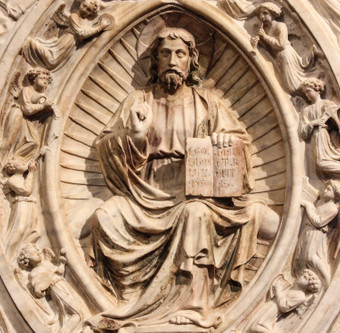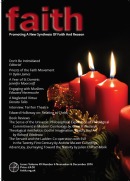
A Year of St Dominic
Article:
01.12.16
In April 1215, Fr Dominic Guzmán, with six companions, crossed the threshold of a small house in Toulouse given them by two wealthy citizens. It was the birth of one of the great Orders of the Catholic Church, the Dominicans, or to give them their proper title, the Order of Preachers. Dominic was about forty-five years old by then, and had only six more years to live, but all his life and experience up until then had been preparing him for this moment, and the six years before his death saw the Order increase at a phenomenal rate, a testimony to the divine inspiration behind it. Dominic was born in the little village of Caleruega, Spain, about the year 1170 and from a very early age had been drawn to the priesthood. After his ordination, his bishop, Don Diego d’Acebes, who recognised exceptional qualities in him, persuaded him to join the Cathedral chapter, where he was able to live a life of intense prayer within his duties in the Cathedral. It was part of the bishop’s plan to rejuvenate the spiritual life of his diocese. In 1203, Dominic accompanied his bishop on a diplomatic mission to Denmark, which opened his eyes to the vast missionary lands that had never heard the Good News of Jesus Christ.
New evangelisation
Nearer home, he was also aware of the acute need that the Church had for a new evangelisation of their people, a need that was recognised by his bishop, and also by the Pope himself. It was a time of upheaval, when people were moving out of the countryside into the towns and cities in search of work. The older Orders of the Church were situated in remote parts of the countryside and no longer served the needs of the people as they had in the past. Dominic recognised that the Church needed an Order that could be where the people were, with members well trained in the Scriptures and in the Church’s Tradition, who could speak directly to them.
The Order of Preachers was revolutionary in that previously, priests received their faculties to preach from their bishop, but this was an Order independent of the bishops, but under papal authority to preach. Dominic recognised that the Church needed an Order that could be where the people were, with members well trained in the Scriptures and in the Church’s Tradition, who could speak directly to them.
This was badly needed, because the Cathars were making great inroads, appealing to Catholics who saw in them men and women who were living a simple life, many of them in great austerity, and with a spirituality that met an evident thirst among the faithful. This was in contrast to the Church, which now seemed remote, many of whose priests were woefully untrained to preach the Gospel and who left their flock spiritually unfed. The Pope had taken steps to remedy this by sending out a mission of Cistercians on a preaching mission, to which Dominic was attached. Dominic had a great admiration and respect for the Cistercians, even being given the habit, without joining the Order, but he was horrified with the sumptuous train they had adopted as fitting a Papal mission. It left them wide open to ridicule when contrasted with the austerity of the Cathar preachers. Dominic persuaded them to abandon their entourage, to walk on foot, to adhere to their customary Cistercian austerity, and had some success.
Learning and preaching
After that came ten years labouring as a parish priest of Prouille, a period of little success in gaining converts from Catharism, although he founded a small community of nuns who wanted to remain Catholic while living a life of comparable simplicity as they would have had as Cathars. This would be the foundation of the Dominican Sisters.
All this was preparation for his Order that was born in 1215. From the very beginning he wanted his brothers to adopt a poverty of life that would match or even surpass that of the Cathars. He wanted them to be situated especially in the great University cities, not only of Toulouse but also of Paris, Bologna, Oxford and Cambridge, to make them well trained, not only in Scripture and theology, but in the secular learning of the time, which in university training always preceded Scripture and theology, the Queen of Sciences. The friars’ first obligation was to preach, but they could not teach what they had not first learnt. His friars must be steeped in the Scriptures and in the great spiritual patrimony of the Church. In the custom of the day, in the university they would be trained to understand thoroughly the teachings of those they opposed, in order to put a reasoned Catholic response. The cells in the first houses of the Order had no doors, because what they learnt in their cells, and the prayer that was its vital accompaniment, had to be open to the world.
This was the beginnings of the Dominican Order, and their mission to evangelise continues today. In many ways the challenges that Dominic faced in his days, eight hundred years ago, are very similar to those that the Church faces today, and therefore Dominic has a message for us now as to how we can meet those challenges. The friars’ first obligation was to preach, but they could not teach what they had not first learnt.
Prayer
First of all, Dominic was a man of prayer, and the fruitfulness of his mission lay in those years of preparation ‘in the wilderness’, in his intense prayer as his Order spread and took root. To the extent that every one of us is alive with God’s love, showing to the world the joy and the peace of God, will our witness be fruitful, too.
The motto of the Dominican Order is ‘Veritas’, which throws down the gauntlet to our age in which the accepted wisdom is a relativism that asserts, ‘Something may be true for you, but that doesn’t make it true for anyone else.’ (This being the only infallible truth!) Not so, says St Thomas Aquinas, the great Dominican. There is ultimate truth, and if our lives are not ordered to that truth then our lives, and ultimately society, will be disordered because it is not grounded in truth: ‘Truth must consequently be the ultimate end of the whole universe… for the first author and mover of the universe is an intellect …and the ultimate end of the universe must, therefore, be the ground of the intellect. This good is truth.’ The Church must continue to affirm that Truth is a Person, the Person of Jesus Christ, and that there is ultimate truth.
In his day Dominic confronted Catharism, of which the New Age movement in its various forms is a descendant, and even the neo-atheism of today. They bear a great resemblance to what Pope John Paul II called ‘the culture of death’, with its downgrading of marriage, its advocating of euthanasia, abortion and contraception. By opposing these things the Church is a ‘sign of contradiction’ to the beliefs of the secular world, and other faiths, while acknowledging whatever is good, true and beautiful in other faith systems.
Truth in love
Dominic reminds us that we need to be truly grounded in our faith so that we can respond when challenged, but always ‘speaking the truth in love’ as he did. He countered the Cathar heresy by pondering deeply on the Scriptures and by living in close union with Life Itself in the person of Jesus Christ. He showed by his own way of life the winsomeness, the joy and the attraction of life lived to the full because lived in God; in other words, living out the Gospel of Life. By his grounding in the Scriptures, aligned with the medieval disciplines of the secular sciences of his day, he was able to give a reasoned and persuasive alternative to Cathar teachings.
Faith and Reason
Pope Emeritus Benedict XVI, as well as Pope St John Paul II, was very concerned with what the secular world sees as the opposition between faith and reason, but which the Church sees as its two wings. As Pope John Paul said, ‘God has placed in the human heart a desire
To the extent that every one of us is alive with God’s love, showing to the world the joy and the peace of God, will our witness be fruitful, too. to know the truth – in a word, to know himself – so that, by knowing and loving God, men and women may also come to the fullness of truth about themselves’ (Faith and Reason: Introduction). God has given us reason to search out the mysteries of the natural world, but that same reason is a tool to search out the mysteries of God, too. At the same time God has given the gift of faith to understand truths that transcend the natural world. Pope John Paul II also points to why Dominic was so successful in integrating his prayer and study in his discussion of Saint Anselm. (Faith and Reason, 11)
“Saint Anselm underscores the fact that the intellect must seek that which it loves; the more it loves, the more it desires to know. Whoever lives for the truth is reaching for a form of knowledge which is fired more and more with love of what it knows, while having to admit that it has not yet attained what it desires.”
The people of Dominic’s day had a thirst for God which lay dormant, or sought its fulfilment outside the Church; the same is true today. When Dominic preached the Gospel and demonstrated it in the way he lived, when people saw it in the love of God which flamed from him, they flocked back to the Church as well as into his Order. His example encourages us to follow in his footsteps, to be filled with the love of God revealed in Jesus Christ; to seek to know him in ever greater depth. We can be confident in the knowledge that all true searching into the depths of the deposit of our Faith and in the world around us, which are never in opposition, can only bring us closer to God. He is ever beyond our natural understanding, but knowledge of him is open to all through the gifts of faith, hope and love.
Notes:
Jennifer Moorcroft is a Carmelite tertiary, now retired and living in Wales. She is the author of The Hidden Light, a biography of St Dominic

